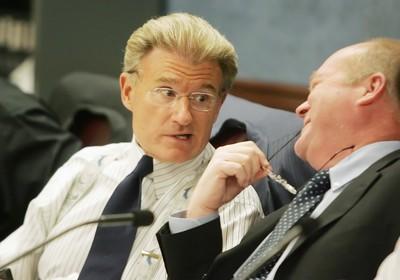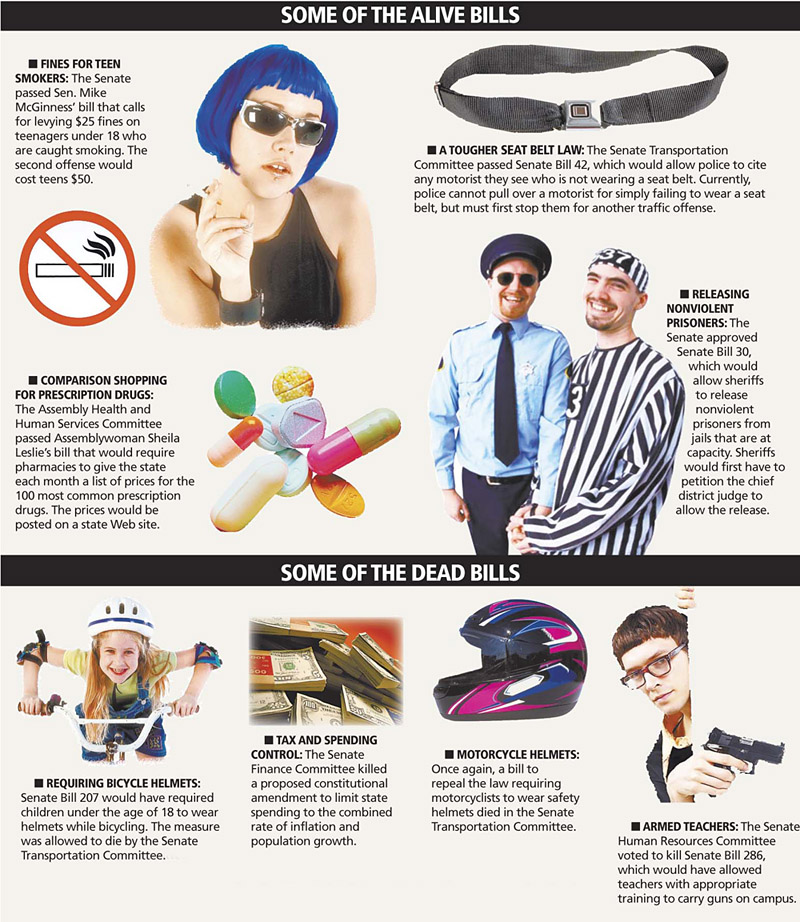Make it or break it time here
CARSON CITY -- It was do or die time in the Legislature on Friday, when the pet measures of the 63 lawmakers had to receive a favorable vote to get out of committee. Some did. Some died.
Motorcyclists will have to continue to wear their protective headgear after a measure to repeal the state's helmet law died in a Senate committee.
But children riding their bikes won't have to wear helmets, after a bill mandating their use failed as well.
Motorists may soon have to pay closer attention to school police officers now that a bill letting them write citations on adjacent streets is on its way to approval.
And for kids who smoke, those school police officers, as well as other law enforcement, might soon be able to cite those under age 18 who light up.
Not fastening a seat belt may soon get you pulled over by police. And running a red light might get you a traffic camera-generated ticket.
The Friday the 13th deadline is one of many the Legislature has imposed on itself in an attempt to meet a constitutional requirement that it finish its work in 120 days. The next big deadline is April 24, when Senate bills must pass out of the Senate, and Assembly bills out of the Assembly, for consideration in the other house.
On Friday, some lawmakers saw more success than others.
Sen. Joe Heck, R-Henderson, said all of his measures survived the first hurdle.
Three of his bills passed the Senate on Friday. They include Senate Bill 58, which would create a new administrative assessment on moving violations to help fund rural emergency medical responders; Senate Bill 53, which would prohibit performers from claiming a misleading connection to a musical group; and Senate Bill 171, which would create the Nevada Academy of Health.
Heck said he is proudest of the emergency responder bill because those rural volunteers are underfunded and often work with outdated equipment.
"I think it is something that has just been sorely overlooked for too long," he said.
It will generate nearly $3 million a year that will be available through a competitive grant process, Heck said. "It's a lot of bandages and splints."
A more controversial proposal sponsored by Heck, to deny the Millennium Scholarship to noncitizens, is also still alive, but faces an almost-certain death in the Democrat-dominated Assembly.
A proposal to ask voters whether Nevada should establish a state lottery was approved by the Assembly. But its future is also doubtful. A committee in the Republican-controlled Senate rejected a similar measure two years ago.
Senate Minority Leader Dina Titus, D-Las Vegas, said she was pleased that a number of her measures had made it out of committee by the deadline, including a bill imposing restrictions on where sex offenders can live and another expanding the availability of a cervical cancer vaccine.
Titus said it's too early to declare victory on the various measures. "We're making progress and I'm pleased with that," she said.
But Titus' bill mandating that insurance companies provide coverage of the cervical cancer vaccine for their customers hit a rough patch on the Senate floor. Senate Bill 409 passed on a 12-9 vote, but one of those voting in favor, Sen. Mark Amodei, R-Carson City, asked for reconsideration of the measure on Monday.
Some lawmakers were concerned about the mandate to insurance companies. If a couple of votes change, the bill could die.
A lawmaker who has had less success this session, Sen. Bob Beers, R-Las Vegas, took it in stride. Several bills he sought -- to repeal the motorcycle helmet law, allow trained teachers to carry concealed weapons on school grounds, and to impose a constitutional limit on government spending -- failed.
"I have a history of having bills getting approved the second time around," he said. "The ideas I have offered historically are not slight adjustments to existing law. They are conceptual. And initially people are resistant to change."
The last bill which the Senate Finance Committee acted on before the Friday deadline was Beers' Senate Joint Resolution 7, a proposed constitutional amendment to limit state and local government spending increases to the combined rate of inflation and population growth.
It was killed on a 4-2 vote. The proposal, dubbed by Beers as the Tax and Spending Control in Nevada (TASC) amendment, also was killed two years ago by the same committee.
Beers said he wasn't sure whether he will circulate petitions to put TASC before voters in 2008 as he tried to do in 2006. The Supreme Court knocked the measure off the ballot.
But Beers did see some success. A bill that would make English the official language of the state of Nevada was approved in Senate Government Affairs after it was changed so its focus is improving the lives of immigrants by encouraging them to learn the language.
Taken out of the measure were requirements that most official state proceedings be conducted in English, state publications be printed only in English, and that the public records of the state to be made available in English only.
The most unhappy legislator on Friday the 13th might have been Assemblyman Ty Cobb, R-Reno. None of his seven bills were approved before the deadline. Only three received hearings.
One that did not receive a hearing before the Assembly Judiciary Committee was Assembly Bill 451, a proposal to deny state benefits to noncitizens.
Illegal immigration "was the number one issue on people's minds and it was not even given a public hearing," Cobb said. "Not a single vote was conducted on my bills. The majority party in the Assembly would rather ignore the problem of illegal immigration, rather than deal with it. On the whole, they don't have a problem with giving benefits to illegal aliens."
Cobb said he didn't know if the lack of action on his bills was retaliation from Democrats upset because he cast the only vote against Barbara Buckley becoming speaker. The vote on Buckley becoming speaker on Feb. 4 was largely ceremonial, since Democrats control the Assembly and had already privately picked her for the post. Traditionally, members of the opposition party vote for the speaker candidate chosen by the majority.
Assembly Minority Leader Garn Mabey, R-Las Vegas, would not attribute the rejection of Cobb's bills to retaliation for his vote against Buckley.
Judiciary Chairman Bernie Anderson, D-Reno, said Cobb had a right to be upset, but Cobb's immigration proposal largely dealt with matters better addressed by Congress, not the state Legislature.
"It created four, five or six constitutional questions," Anderson said. "It was a very complicated bill and we had time constraints."
Although legislators were disappointed their bills failed, Assembly Majority Leader John Oceguera, D-Las Vegas, questioned whether it matters to the public.
"I don't think anybody is going to be hurt by less laws being passed," he said.
Sen. Terry Care, D-Las Vegas, took the opportunity Friday to comment on the failure of his bill to overturn a Clark County ordinance that he called a blatant unconstitutional infringement on free speech. The bill, which would have barred governments from restricting the content of signs displayed on sidewalks, was prompted by the arrests of two street preachers on the Strip in 2005.
Local governments' objections doomed the measure, he said.
"Clearly the message is we believe in the First Amendment, of course we do, we just don't want you to exercise your rights under it," Care said.
2007 Nevada Legislature























